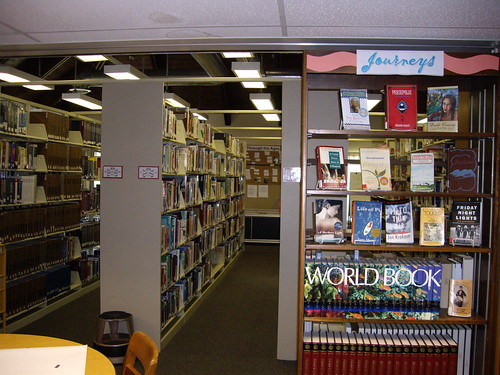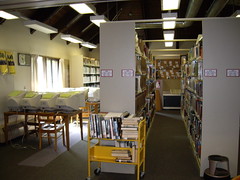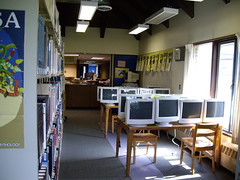When writing a draft of a story or poem, it's really important to keep writing and not look back on the work and start editing. Once the editing begins, it's possible for a person to lose the real story to the turn of a phrase or the flip of a sentence. The idea should be the primary goal during the draft process, the process of discovery. I haven’t always perceived my role as a learner similarly, but as I write this, the goal of this class becomes clearer. This is a class for discovery and for experimentation. It is about the possibilities.
Once we are actually working in libraries, however, we move from the draft phase to the editing. The reality of editing makes it hard for me to embrace the exploration of technological possibility. In my head, I keep hearing the voices of my school’s Tech Chair and administrators. I am taken aback by my naturally skeptical nature and my own hesitations about technology and change.
I want to be enthusiastic and optimistic, but I find myself focused on the ways in which things can’t work. I think about the physical roadblocks: the cables that aren’t movable, the tables that just won’t fit anywhere else, the computers that HAVE to be somewhere else. I remember the logistical issues that make adding software or updating the card catalog long, difficult processes. In my position, I have not been given the privileges that would make these tasks under my immediate control. I have to put my requests to others and justify every decision. I have to decide what is truly worth entering the bureaucratic maze.
I also face additional human roadblocks in the form of teachers who are too overworked or old-fashioned or scared to embrace new technology. So, in this class, when I should be charging forward, dazzled by the prospect of new ways of teaching and learning, I find myself imagining the glazed over faces of the teachers to whom I’ll be introducing ANOTHER new way of doing things.
Some of these roadblocks are just plain out of my control, others require a little bit of patience and perseverance, and still others reflect my own insecurities, perspective, and understanding that there is only so much that can be accomplished in a day or week or year. As I challenge the editor within myself who keeps trying to revise the draft before it’s done, I realize part of my frustration is because I LOVE some of the things I’ve been learning. I can see the potential of where we can take students—if the conditions are just right. I have to remember to keep being the writer, the learner, the explorer. I wish my mind didn’t echo “roadblock” each time I hear a new idea because I really want to put some of these ideas into action. I want to be more open to the ideas, to push my library work and myself.
I’m hoping that I’m making at least a baby step with my innovative project. I could really see it working, and hope it does. I’m starting with something small and focusing on a perceived need which might be resolved via
del.icio.us. Since none of the school computers can hold bookmarks on their computers, I can use technology to help teachers and students easily access the items they often refer back to. Enter
del.icio.us/Feehanlibrary. It's a start at turning roadblocks into speedbumps.
I think my realistic (okay, and somewhat skeptical) nature has a place in library science and particularly in terms of technology. I just have to be sure to use it to a positive end. I need to ask questions such as: What is the greatest need in my academic setting? Where can I make a positive difference? What is possible within the given constraints? If I ask the right questions and don’t let myself become overwhelmed with thoughts of “this will be more trouble than it's worth”, I think I can make the process of learning more powerful and efficient for the students and teachers at my school. Who knows? We could all be surprised.







